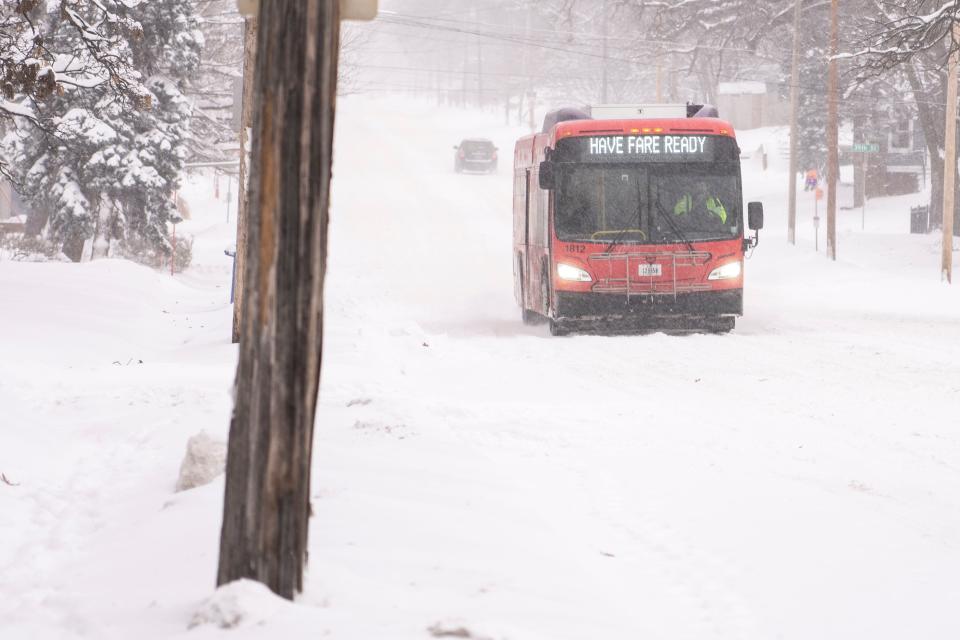DART asks Des Moines to 'compromise' with lower franchise fee to avoid service cuts
In an attempt to keep its head above water, the Des Moines Area Regional Transit Authority is asking the Des Moines City Council to approve at least a partial amount of a new funding mechanism to avoid "drastic" cuts to its bus services.
During its monthly meeting this week, DART leaders and commissioners offered a "compromise" that would require the regional bus service to reduce its expenses up to $3 million and ask Des Moines to approve a 1.5% franchise fee, a tax on gas and electric bills, instead of the full 2.5% allocated by Iowa lawmakers in 2023.
DART officials on Wednesday also published survey results and feedback from public meetings held in late 2023 meant to get a pulse on whether community members were in favor of Des Moines providing additional revenue through the franchise fee and how possible service cuts might impact community members.
More: Des Moines bus riders could lose their 'lifeline' if DART cuts service to balance budget
The state's only regional transit system, which is primarily funded through property taxes, faces an estimated $2.7 million deficit in fiscal year 2025 if Des Moines doesn't increase its share of funding, DART officials contend.
This means the transit system could see a 40% reduction in services over the next five years, with the first round starting in November affecting nearly all local bus routes in Des Moines. For the majority of public transit users, the proposed cuts would likely mean longer wait times; less frequent bus service, with some routes running only at peak travel times; and limited weekend service.
Alternatively, the City Council could vote to increase its franchise fee up to 2.5% to fund public transit. That would offer, at least temporarily, a reprieve from cuts to current bus routes and service levels, according to DART.
During the meeting, Des Moines Mayor Connie Boesen, who now serves as the council representative on the agency's board of commissioners, said she supports public transportation but it would be difficult for the city to commit to a full 2.5% franchise fee. She added the council will have additional discussions about its options.

The council must decide sometime in February for DART to begin its budget process. Part of the new proposal includes DART cutting expenses by $2 million to $3 million, which includes making cuts to services, to lessen the impact on property taxes for all member communities.
"We understand the issues, we understand that we've got to get a long-term solution," Boesen said. "But this is around the country, this is not new ... even big cities are having issues."
More: Grimes council votes to eliminate bus service, cut ties with DART
In meetings with Des Moines City Council members, some members have said they want DART to consider sustainability, alternative service delivery and funding options, DART Chief External Affairs Officer Erin Hockman said during the meeting. Some also say there's a hesitancy to increase taxes, she said.
Should the council choose a 1.5% fee, a resident with a $100 utility bill would see a $1.50 per month increase, which is an additional $18 per year.
DART CEO Amanda Wanke added there's an understanding that "there's no easy answer" but the hope is to "come to the table" with a plan that will stabilize the agency.
Wanke warned if the city and the agency couldn't come to a consensus over the next few weeks, it would have to move forward on the "worst-case scenario."
What do Des Moines residents and DART bus riders say about the proposed cuts?
The report shows 1,136 people responded to the survey, 73% of whom are Des Moines residents, and another 253 people attended one of six public meetings.
According to the results, 92% of Des Moines residents who responded to the survey said city leaders should provide more funding to maintain or expand DART services.
More: Why drive when you can walk? Alec Davis envisions a more pedestrian-friendly Des Moines
Non-riders, which made up 11% of the survey participants, were split over whether Des Moines should increase its franchise fee. About 55% of them agreed the city should implement the fee and find additional revenue to expand services. In contrast, 45% do not want a franchise fee and said DART should cut services.
According to the report, 68% of respondents are fixed route users. These participants also were torn on how DART should reduce its services, should it need to make cuts.
If DART makes significant cuts to services, 47% of riders said they would continue to use the service as much as they do today, 42% said they would ride less often and 11% said they would stop riding, the survey results showed.
Should DART need to cut services, officials will use public input feedback to propose changes. There could be more public input meetings on those proposed changes in mid-spring, officials said.
Virginia Barreda is the Des Moines city government reporter for the Register. She can be reached at vbarreda@dmreg.com. Follow her on Twitter at @vbarreda2.
This article originally appeared on Des Moines Register: DART asks Des Moines to 'compromise' to avoid bus service cuts

